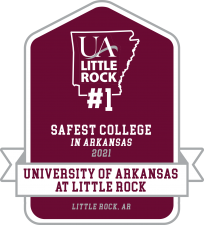Location
The primary location for the Emergency Operations Center (EOC) will be the UA Little Rock Police Department headquarters with its radio, teletype, telephone, emergency generator, and computer communications capabilities.
The EOC will be staffed by the UA Little Rock Police Department and/or personnel from responding agencies.
In the event that this location is not functional, an alternative site will be established at an available location that can be adapted to that purpose.
The EOC will be the main headquarters in emergencies involving only the university and will coordinate with all outside emergency response agencies.
Purpose and Role
The purpose of the EOC is to coordinate responses to major emergencies at the university and to assist and facilitate the Incident Commander in providing resolution to the incident.
Additionally, the EOC provides information for the support functions of the Emergency Response Team to facilitate crisis response and recovery as well as communicating with those staffing the Emergency Event Support Center (EESC) if the establishment of the EESC becomes necessary.
It must be emphasized that the role of the EOC is not to manage the initial response to an incident. These activities (isolate, contain, and neutralize) are managed by the appropriate emergency responder’s incident commander at the scene of the incident. During the initial crisis, the members of the EOC should be supportive of:
- Providing resources and information for field operations as quickly as possible when requested.
- Demonstrating patience when there is a lack of information from the field. Particularly in the early stages of an event, there may be a tendency to over-analyze and begin to think about ways to direct the field operations. Personnel at the EOC should resist this and allow the field personnel to direct all their attention to the event.
- Tracking and providing status reports on various activities that have been initiated and the resources that have been mobilized either to assist the field operations or to manage the activities away from the scene of the event.
- Advising the field operations in some instances where immediate decisions do not need to be made.
- Briefing those who will want to know the status of the operation.
